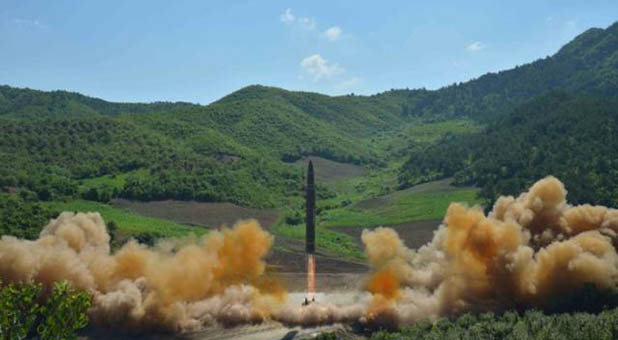Report: Russia Has Taken a Side in the U.S.-North Korea Dispute
North Korea declared its Tuesday launch of a Hwasong-14 missile constituted its first-ever successful test of an intercontinental ballistic missile.
The United States, South Korea and Japan have concluded it was an ICBM. The United Nations has concluded it was an ICBM. Independent observers in the scientific community say the data suggests it was an ICBM, too.
Russia says it’s not so sure. And, as The Washington Times was reporting Thursday night, it’s blocking a U.S. push for new and tougher UN sanctions against the Hermit Kingdom and its enablers based on those doubts.
The paper reported:
Russia on Thursday blocked a U.N. Security Council Resolution drafted by the U.S. that called for “significant measures” in response to North Korea’s launch of an intercontinental ballistic missile (ICBM).
The U.S. circulated the statement among the 15-member council after announcing plans for a new sanctions resolution against the nuclear-armed regime in North Korea. But an objection by Russia killed the statement, said a U.N. diplomat.
Russian officials argued that the missile launch Tuesday had not been verified as an intercontinental missile.
It is guaranteed this will become one of the principle issues President Donald Trump brings up during his first-ever face-to-face meeting with Russian President Vladimir Putin. The two leaders were still scheduled to meet as of this writing on the sidelines of Friday’s G20 summit in Hamburg, Germany.
Putin may be attempting his own “tough negotiations” with the president, who just announced Thursday he was expanding the availability of liquefied natural gas shipments to Eastern Europe—breaking into what was once a Russian monopoly. He may also be looking for a softened approach regarding his nation’s invasion of parts of Ukraine.
Neither the White House nor the U.S. Mission to the United Nations has responded to questions about the report. The president has said, however, he would not be “telegraphing” what action he plans to take, but has made it clear he is willing to forge his own path to a solution—diplomatic or otherwise—if the UN Security Council is unable to act due to obstruction from the Russians or Chinese.
The current situation is untenable, almost every Asia-Pacific security expert has warned, now that Alaska, much of Canada, and several key U.S. allies in the region are all now within range of what North Korea has described as a “nuclear capable” missile. There are also substantial doubts as to whether or not U.S. missile defense systems will be fully capable for protecting U.S. assets and interests from such an attack. {eoa}
















































